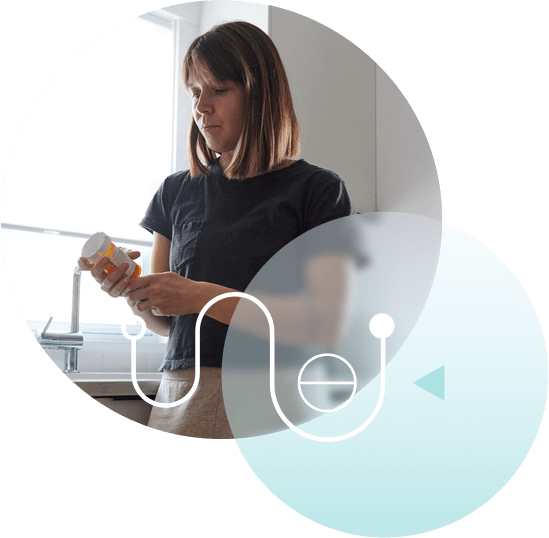PRESCRIPTION MEDICATION
Fluoxetine
type of medication:
Fluoxetine is a commonly prescribed antidepressant medication (SSRI) that’s often well-tolerated and effective.
Treatment for:
Major depressive disorder, obsessive-compulsive disorder (OCD)

PRESCRIPTION MEDICATION
type of medication:
Fluoxetine is a commonly prescribed antidepressant medication (SSRI) that’s often well-tolerated and effective.
Treatment for:
Major depressive disorder, obsessive-compulsive disorder (OCD)

We offer affordable care for everyone and accept most major insurance, including Medicare and Medicaid.
Learn more






fluoxetine


Mimi Winsberg, MD
Chief Medical Officer, Brightside Health
Stanford-trained psychiatrist with 25 years of practice
At Brightside Health, our psychiatric providers specialize in finding the right medication for your specific needs. As part of your treatment, your provider may recommend fluoxetine. They’ll go over how the medication works, and answer any questions you may have.
In the meantime, we’ve provided some general information about this medication below. If you have any further questions, please feel free to contact us at [email protected].
Fluoxetine, commonly sold under the brand name prozac, is a type of antidepressant called a selective serotonin reuptake inhibitor (SSRI) commonly prescribed to treat various mental health conditions, including depression, obsessive-compulsive disorder (OCD) and panic disorder.
Serotonin is a natural substance in the brain that produces a feeling of mental wellbeing and helps maintain mental balance. We use SSRIs to help balance the serotonin levels in your brain—increasing those levels can improve your mood. Serotonin is one of the major chemical messengers (neurotransmitters) used to carry a signal from one brain cell to another.
Fluoxetine produces more serotonin in your brain. With more serotonin, your brain can grow new cells and form stronger connections. This type of medication also blocks neurons from reabsorbing serotonin, which means more serotonin is available to help transmit messages between neurons.
Antidepressants like fluoxetine may also help grow cells in an important part of your brain that regulates mood and anxiety. This region is called the dorsolateral prefrontal cortex (DLPFC). When cells in this region are activated, they can help regulate mood, memories, anxiety, anger, and fear.
At Brightside, we use fluoxetine to treat:
In some cases, our team may prescribe fluoxetine to help with symptoms of premenstrual dysphoric disorder (PMDD). We may also prescribe it to take with other medications, like olanzapine (Zyprexa), to help hard-to-treat depression and bipolar disorder.
Providers may also prescribe fluoxetine to treat other conditions, including:
At Brightside, our psychiatric providers specialize in personalizing treatment for each person. We give you personal attention and expert advice you can count on—we explain all your options and use our expertise to find the medication that’s right for you. We make sure you understand how medications work and what to expect so that your treatment is worry-free.
When you take fluoxetine, it can improve your low mood to keep you from feeling sad, empty, or tearful. It can also help with troublesome thoughts that don’t go away on their own.
Fluoxetine can also help with:
We understand you may be wondering whether this medication will work for you. It’s a common concern, and unfortunately, there isn’t a straightforward answer.
Many different factors influence how you respond to a medication. Keep in mind that some medications work better for certain people than others. Each person is different—genetics, age, and gender, among other differences—so your response to fluoxetine may be different from someone else’s response. Other factors such as underlying health conditions, other medications, and dietary considerations can also play a role in how a medication helps your symptoms.
At Brightside, we can help you find the right medication and find the right treatment to help you feel better.
Before starting a new medication like fluoxetine, you should get a comprehensive health assessment from a provider or provider who understands your health history. You should only take fluoxetine if a qualified psychiatric provider prescribed it for you.
It can take three to four weeks before you start feeling the effects of fluoxetine. We understand that this can feel like a long time, but it’s important to continue taking your medication even if you don’t feel improvement right away. In some cases, your provider may need to adjust your dosage for you to get the maximum benefit from the medication. At Brightside, our board-certified providers will closely monitor your progress to make sure this medication and dosage is right for you.
We know that mental health concerns often can’t wait, so if you need to meet with a provider right away to discuss a new or existing medication, Brightside offers same-day provider consultation and telehealth services.
Before you start taking fluoxetine, you may have some concerns about how long you’ll need to take this medication. The amount of time you take an antidepressant will depend on your treatment plan—it varies based on your symptoms and how you respond to the medication. Some people may only need the medication for a few months, while others may stay on a medication for several years.
Once you start taking fluoxetine, you may need to stay on it for at least six months. A study that tested the effect of antidepressants on panic disorder found that patients responded to the treatment after about three months, with the treatment phase lasting between two and six months.
If this is your first time taking depression medication, we may recommend that you stay on the treatment for 6-12 months. Remember that your treatment may take longer if you need to switch doses or medications, add medications, or if your anxiety or depression doesn’t respond to treatment.
Your Brightside team will work with you to determine what course of treatment is best for your specific needs. Most importantly, we recommend that you keep taking your medication until your provider says it’s time to stop—even after you start to feel better.
Studies have shown that antidepressants relieve symptoms of depression about 40-60% of the time and additional treatments (such as therapy and lifestyle improvements) on top of medication often lead to the best outcomes.
To get the best results with a medication, it’s important to consistently measure progress during treatment. This is known as Measurement Based Care, and it’s the approach that we use at Brightside. It’s common to adjust the dose and/or medication when starting antidepressants until you find just the right fit.
Fluoxetine is a safe and effective antidepressant. However, it’s important to keep in mind that its effectiveness varies from person to person.
A 2018 study that compared 21 different antidepressant drugs found that other antidepressants were more effective than fluoxetine in treating major depressive disorder (MDD). However, other studies have shown that it can help depression for people of all ages, especially youth and adult patients.
According to the U.S. Food and Drug Administration, trials have shown that adults who take between 20-60mg of fluoxetine experience improvement in obsessive-compulsive disorder (OCD) symptoms. Multiple trials have also proven that fluoxetine can reduce or eliminate panic attacks in adults.
We understand that you may have some concerns about how fluoxetine affects you, but you don’t have to worry about it changing your personality. The goal of this treatment is to help you feel better—like yourself again—and restore your good mental health. But remember, it doesn’t happen overnight. Keep taking your medication as prescribed, and talk to us if you have any questions or concerns.
Fluoxetine is generally a safe medication, but it’s important to talk with your Brightside team about potential side effects of this treatment.
Side effects from fluoxetine are usually temporary, but talk to your provider if any of these symptoms become severe or don’t go away:
In rare cases, fluoxetine can also cause severe side effects. Call a provider right away if you experience:
According to the FDA, a small number of children, teenagers, and young adults who took fluoxetine in clinical trials became suicidal. Research has shown that younger people who take antidepressants for depression or other mental illnesses may be more likely to have suicidal thoughts.
At Brightside, your health and safety are our highest priorities. We make sure you get individual attention and guidance to help you feel your best.
Antidepressants are not physiologically or psychologically addictive, but they can cause a discontinuation syndrome if stopped abruptly, so it’s important to continue taking your medication and talk to your doctor about any changes you’d like to make.
Discontinuation syndrome is a consequence of abruptly stopping certain types of antidepressants—particularly selective serotonin reuptake inhibitors (SSRIs) and serotonin-norepinephrine reuptake inhibitors (SNRIs).
Discontinuation syndrome can include a range of symptoms that may occur in patients who suddenly stop their SSRIs or SNRIs. These are the most common symptoms of discontinuation syndrome:
If you would like to stop taking fluoxetine, make sure to talk to your Brightside provider. We can help you safely wean off your medication when the time is right.
If you are pregnant or plan to become pregnant, you should talk to your provider before making any medication changes. At Brightside, we can also help you weigh the pros and cons of continuing your medication while pregnant.
Some studies suggest that taking SSRIs like fluoxetine during pregnancy may contribute to complications, such as low birth weight and premature delivery (delivery before 37 weeks of pregnancy). Although there is minimal risk of birth defects, there may be safer ways to manage your symptoms while you’re pregnant.
Because fluoxetine can pass into breast milk, it’s also important to talk to your provider if you plan to breastfeed. You and your provider can develop a plan to manage your symptoms and feed your baby safely.
Fluoxetine is not addictive and is not a controlled substance, but if you have concerns about your dependence on this medication, don’t hesitate to talk to your Brightside team.
You can view the FDA black box warning for fluoxetine here. If you have questions about whether the black box warning for fluoxetine applies to you, please talk to your doctor.
GETTING STARTED WITH BRIGHTSIDE
Start your journey towards life-changing care in a matter of minutes. You’ll receive compassionate support and expert advice the entire way.
Complete a quick questionnaire, then connect 1:1 with your dedicated provider to discuss your needs.
Your provider will pinpoint the most effective medication for you and send it to your pharmacy of choice.
Weekly check-ins help you keep track of symptoms, giving your provider data to make adjustments.
Watch your scores and well-being improve along the way with our Proactive Progress Tracking tool.
OUR PSYCHIATRY plans
Because quality mental health care shouldn’t be out of reach for anyone.
PERSONALIZED
Pay with insurance
or $95/month
comprehensive
Pay with insurance
or $349/month
We accept insurance.





“I feel MUCH IMPROVED! My medication works well for me, and the personal care I have received has been wonderful! My provider listens to me with understanding and compassion.”
Tonya T
“5/5. My provider is excellent and takes time to understand my symptoms and make informed medication determinations. After many years of being on multiple medications, I am feeling much relief after less than two months of treatment.”
Anonymous
“Happier than I have been in years. One of the best decisions of my life was trying Brightside.”
Michael P
“I was impressed with how fast I was able to get an appointment as the wait in my area is months long. I received helpful medication quickly, which is also hard to get here. My provider is terrific, helpful, and kind. The zoom appointments are great for my hectic life. Really love this program so far!”
Anna W
“Very easy and simple to get the medication I needed. Since starting to use Brightside, I have begun to feel so much better about myself and I wake up every day with a sense of excitement that wasn’t there before!”
Brandon D
“It is so convenient to get medication and a therapist that work with my schedule. The quality of care is beyond top notch, and being able to see someone on Sundays is so convenient for people who work during the week.”
Anonymous
“I feel MUCH IMPROVED! My medication works well for me, and the personal care I have received has been wonderful! My provider listens to me with understanding and compassion.”
Tonya T
“5/5. My provider is excellent and takes time to understand my symptoms and make informed medication determinations. After many years of being on multiple medications, I am feeling much relief after less than two months of treatment.”
Anonymous
“Happier than I have been in years. One of the best decisions of my life was trying Brightside.”
Michael P
“I was impressed with how fast I was able to get an appointment as the wait in my area is months long. I received helpful medication quickly, which is also hard to get here. My provider is terrific, helpful, and kind. The zoom appointments are great for my hectic life. Really love this program so far!”
Anna W
“Very easy and simple to get the medication I needed. Since starting to use Brightside, I have begun to feel so much better about myself and I wake up every day with a sense of excitement that wasn’t there before!”
Brandon D
“It is so convenient to get medication and a therapist that work with my schedule. The quality of care is beyond top notch, and being able to see someone on Sundays is so convenient for people who work during the week.”
Anonymous